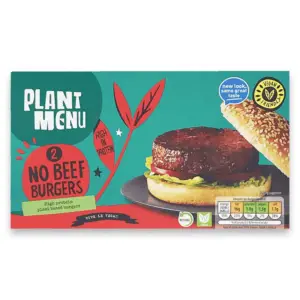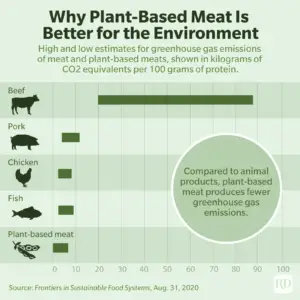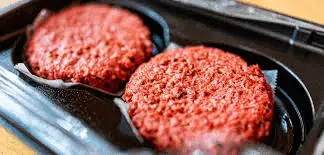The term “plant-based” refers to food that has been made without the use of animal products, such as meat and dairy. For example, plant-based burgers are a great alternative to traditional beef or chicken burgers because they contain no animal products, making them healthier for you and your family. They can be used in place of regular hamburger patties at home or on the go.
Plant-based burgers are an excellent choice when it comes to reducing our carbon footprint and cutting down on greenhouse gases.
Eating a diet rich in fruits, vegetables, whole grains, legumes, nuts, seeds, and soy can help lower your risk for heart disease, diabetes, certain cancers, obesity, and other health problems.

What are Plant-based Burgers made up of?
The ingredients in a typical hamburger patty include beef, bread crumbs, and spices. The exact mix depends on the brand. I can’t speak for all brands, but most contain some combination of wheat flour, water, salt, sugar, spices (e.g., garlic powder), and other additives such as monosodium glutamate or MSG.
There is also a growing trend toward using vegetables instead of meat proteins. This includes pea protein, lentil protein, hemp protein, etc. These are typically mixed with ground flaxseed and other grain-based fillers. Some companies even make their proprietary blends.
They tend to have less fat than regular beef patties, which means they’re better for your waistline. In addition, they usually contain more fiber and protein than regular beef patties.
Most plant-based burgers are made using a blend of soybeans, peas, and other beans. These are often blended into a batter and then formed into patties. There are many variations on how this process works.
Some companies add egg whites to create a binder, while others use baking soda and vinegar to bind the mixture together. Others use a dry mix of flour, cornstarch, and other starches.
Some companies use various non-meat ingredients, including oats, quinoa, rice, potato starch, tapioca starch, arrowroot starch, and other types of starch.
Other companies use gluten-free alternatives like buckwheat, brown rice, millet, sorghum, teff, amaranth, and oatmeal. Finally, some companies use sweeteners like agave nectar, honey, molasses, maple syrup, coconut sugar, or stevia.
In addition to the ingredients mentioned above, various seasonings and garnishes are added to give the burgers their flavor. In addition, some companies add vitamins and minerals to their veggie burgers. For example, Beyond Meat adds iron, calcium, zinc, vitamin B12, and omega-three fatty acids to its product.
Many companies offer vegan options where they don’t use any animal products. One company even makes a piece of vegan bacon.
Another type of plant-based burger uses a “vegetable shortening” called palm oil. Palm oil is extracted from the fruit of the date palm tree. It’s very high in saturated fats and should not be eaten by anyone who doesn’t already eat a lot of saturated fats.
Regarding nutritional content, plant-based burgers tend to be higher in calories than regular beef pattie. However, they provide essential nutrients like protein, fiber, and healthy fats.

Benefits to Health from eating the Plant-based Burger
A plant-based diet includes fruits, vegetables, whole grains, legumes, nuts, seeds, and healthy oils. It is low in saturated fat and cholesterol and high in fiber, antioxidants, vitamins, minerals, phytonutrients, and essential fatty acids.
It has been shown to improve cardiovascular function, decrease inflammation, prevent cancer, promote weight loss, and increase longevity.
A study published in the Journal of Nutrition found that vegetarians had significantly lower C-reactive protein levels, a marker used to predict future heart attacks and strokes.
Another study by the American Heart Association showed that vegetarians were 47% less likely to develop coronary artery disease than meat-eaters.
Vegetarian diets are associated with decreased diabetes, hypertension, stroke, obesity, and certain cancers risk.
According to research conducted at Harvard University, people who adopt a vegetarian diet have higher levels of omega-3 fatty acids in their blood. Omega 3s help protects against heart disease, and some studies suggest they can also help fight depression and anxiety.
A vegan diet is another plant-based diet where no animal products are consumed. Vegans avoid all foods derived from animals, such as dairy, eggs, and gelatin.

There are several health benefits associated with a vegan diet:
Vegans do not consume any animal products, so they get all of their nutrients from plants. This makes them more prone to nutrient deficiencies than those following a typical omnivorous diet. However, the same study shows that vegans have better overall nutrition than those who follow an average omnivorous diet.
Vegan diets tend to be very low in saturated fats and cholesterol, which reduces the risk of developing cardiovascular diseases. This happens because most vegans eat only whole food sources of carbohydrates (such as fruits, vegetables, whole-grain loaves of bread, and cereals) instead of processed foods made primarily of refined carbs.
Another study published in the American Journal of Clinical Nutrition found that vegetarians were at least 20% less likely to develop type 2 diabetes.
A recent review of studies concluded that vegetarian diets are associated with improved survival from significant diseases such as heart disease, stroke, colorectal cancer, breast cancer, and prostate cancer.
In a study conducted by researchers from Harvard University, vegetarians had a 30% lower risk of developing Alzheimer’s disease than those who ate meat.
A study published in the Annals of Internal Medicine showed that people who eat meat have a higher rate of colon cancer than those who don’t. Conversely, vegetarian diets can help protect against colon cancer.
Evidence shows that eating lots of plants reduces the risk of depression. In addition, some studies show that vegan diets are effective treatments for depression.
Vegetarian diets are linked to greater life expectancy. According to research published in Nutritional Neuroscience, vegetarians live longer than meat-eaters.
Eating more plants helps you lose weight. A study published in the British Medical Journal showed that vegetarians lost an average of 10 pounds over six months. This is because vegetables contain fewer calories and carbohydrates than animal products. They also provide essential nutrients like iron, zinc, magnesium, potassium, and folate, then the other.
How does a Plant-based Burger help the environment?
A vegan burger contains no meat or animal products, so there are no emissions from landfills or incinerators. It also uses less water and produces fewer greenhouse gases than a regular beef burger.
It takes about 1 kilogram (2.2 lb) of wheat to produce one pound (0.45 kg) of hamburger meat. That means it takes four times more resources to make a vegan burger than an average beef burger.
If everyone switched to a vegan diet, we could save enough energy to power every home in the world for two years.
According to the United Nations Food and Agriculture Organization, a vegetarian diet costs between $1.50-$3.00 per day. The price varies depending on where you live. For example, one can buy a vegetarian meal in India for just $1.25. In contrast, a similar meal in America would cost around $6.00.
The energy required to raise cows is enormous. Cows need a lot of feed and space to grow and reproduce. In addition, raising cattle requires a lot of natural resources such as pesticides, fertilizers, herbicides, and antibiotics. These chemicals pollute our air and waterways.
The production of dairy products requires a lot of water. As a result, dairy farms use up to 70 percent of freshwater supplies in many parts of the world.
Animal agriculture consumes large amounts of fossil fuels. Animal agriculture uses more fossil fuels than transportation combined.
The United States Department of Agriculture estimates that raising animals for meat and dairy accounts for 80 percent of total U.S. agricultural methane emissions. Methane is a potent greenhouse gas.
Animal agriculture contributes to climate change through deforestation. Animals raised on factory farms require massive amounts of land to sustain them. As a result, factory farming often leads to deforestation. Forests are cut down to create grazing grounds for livestock. This causes soil erosion and pollution. The Amazon rainforest has been cleared twice since 2000 due to the growing demand for soybeans to fatten livestock.
Animal agriculture also affects wildlife habitats. Livestock farmers often use poisons to kill insects and pests. Pesticides enter surface and groundwater sources. Many pesticides are toxic to humans and wildlife. These include DDT, dieldrin, chlordane, endosulfan, toxaphene, malathion, and heptachlor. These toxins have caused cancer, congenital disabilities, and neurological damage.

The side effect of Plant-based Burger Patties
Plant-based burgers are healthier for you. They contain no cholesterol or saturated fat and are also high in fiber. However, some people may experience gas or bloating after eating them. It might be caused by the fermentation process used to make these patties. The fermentation process involves using enzymes to break down the proteins in soybeans into smaller molecules. When this happens, some gasses are released into the food.
Soy contains protease inhibitors, which prevent the digestion of protein. The protease inhibitors remain intact when we eat the unprocessed form of soybeans. However, these protease inhibitors cause problems when we eat the fermented form of soybeans.
Overeating soy causes gas and bloating. Some people find it easier to digest if they avoid eating beans and legumes during the first half of the day. If you suffer from gas and bloating, try reducing your soy intake. You could also try taking probiotics. Probiotics are bacteria that live in our digestive tract. They keep harmful bacteria under control. If you want to know more about how to use probiotics, read my article on probiotic health benefits.
Beef burgers may not be the best option for everyone. If you want to reduce your intake of red meat, try one of these delicious alternatives!
The main issue with vegetarianism is that most vegetarians do not eat enough vegetables. Vegetables are very low-calorie (compared to animal foods) but rich in vitamins and minerals. Also, there are many different vegetables, so you can get various nutrients without consuming tons of calories.
